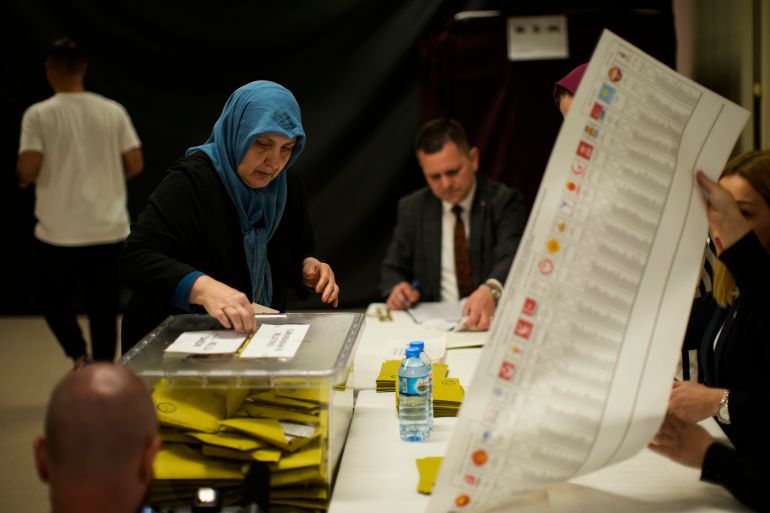Polling stations in Turkey close after momentous election
Voter turnout has been high for an election that could define Turkey’s future.

Turks have finished voting in one of the most consequential elections in the country’s 100-year history, a contest that could end President Recep Tayyip Erdogan’s 20-year rule and reverberate well beyond Turkey’s borders.
Polling stations in the elections, where voters have been selecting their choice for president as well as parliament, closed at 5pm local time (14:00 GMT).
Keep reading
list of 4 itemsTurkey’s Erdogan, Kilicdaroglu end campaigning before election
Turkey’s Antakya gears up to vote amid earthquake devastation
Turkey’s opposition accuses Russia of interfering in elections
A heavy turnout means that there have been long lines at polling stations across Turkey, particularly in its biggest cities. The Istanbul Bar Association has reminded people that if they are already waiting at a polling station before 5pm they will be able to stay and vote, but anyone joining the queue after will not be allowed to vote.
Turkish law bans the reporting of any results until 9pm (18:00 GMT), although that has been brought forward in the past. By late on Sunday there could be a good indication of whether there will be a runoff.
Opinion polls have given Erdogan’s main challenger, Kemal Kilicdaroglu, who heads a six-party alliance, a slight lead, with two polls on Friday showing him above the 50 percent threshold needed to win outright. If no candidate wins more than 50 percent of the vote on Sunday, a runoff will be held on May 28.
The presidential vote will decide not only who leads Turkey, a NATO-member country of 85 million, but also how it is governed, where its economy is headed amid a deep cost-of-living crisis, and the shape of its foreign policy.
Erdogan has steered the nation through one of its most transformative and divisive eras in the post-Ottoman state’s 100-year history.
Turkey has grown into a military and geopolitical heavyweight that plays roles in conflicts from Syria to Ukraine. Its footprint in both Europe and the Middle East makes the election’s outcome as critical for Washington and Brussels as it is for Damascus and Moscow.
So Turkey may enter a post-Erdogan era after Sunday’s presidential and parliamentary elections, and that could mean foreign policy changes.
Erdogan is still lionised across swathes of Turkey that witnessed a development boom during his rule.
More religious voters are also grateful for his decision to lift secular-era restrictions on headscarves and other religious matters.
The emergence of Kemal Kilicdaroglu and his six-party alliance – a group that forms the type of broad-based coalition that Erdogan excelled at forging throughout his career – gives foreign allies and Turkish voters a clear alternative.
Polls suggest 74-year-old secular opposition leader Kilicdaroglu is within touching distance of breaking the 50-percent threshold needed to win in the first round.
A runoff on May 28 could give Erdogan time to regroup and reframe the debate.
But he would still be hounded by Turkey’s most dire economic crisis of his time in power and disquiet over his government’s stuttering response to February earthquakes that claimed more than 50,000 lives.